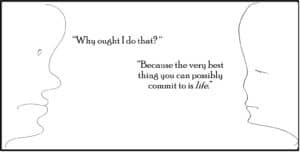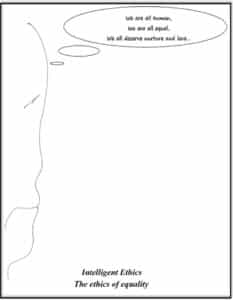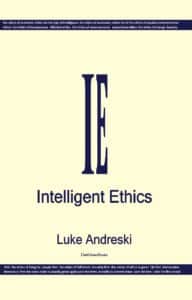In the second article in this series I made the case for morality being a universal sentience unification system – a cognitive tool with the purpose of unifying autonomous self-aware sentients through providing a basis for mutual endeavour and trust. The output of this system is a shared conception of what is right or wrong, what we ought or ought not do.

An analysis of the concept of morality and the way we use moral language shows us that morality has a range of necessary characteristics:
???? Universality
???? Rationality
???? A requirement for sentience
???? A presupposition of freedom
???? Singularity
???? It defines what’s right or wrong
We also see that morality requires a compelling source of authority, a basis for the ‘moral imperative’. Because of its universality the best available candidate for this is life: the essence of what we are. Life is tangible, fundamental, universal and compelling. It is experiential, evidential and can be witnessed and experienced by any self-aware sentient. A commitment to and a reverence for life adds weight and authority to morality’s ‘ought’.

Autonomy and equal entitlement
These aspects of morality give us a degree of confidence about what the content of morality must be. Firstly, if it is to be a universal system that appeals to any sentient being, it will need to recognise two fundamental rights:
???? Personal autonomy
???? Equal entitlement
If a right to these things is not recognised by a universal sentience unification system, why would any sentient community or species sign up to it? After all, if you don’t recognise or respect my autonomy, it would probably make sense for me to run for the hills… And if you or your society do not recognise equal entitlement, how can I know I won’t be the one you decide is entitled to nothing?
Danger
In my previous article, I envisaged aliens on a flyby of our planet.
If, looking down, they saw inhabitants who lived by these two principles, they might be inclined to engage with us. If, instead, they saw a dog fight of each for themselves, why would they? There would be no basis for trust. They would install a warning signal at the edge of the solar system (‘DANGER – AVOID UNTIL FURTHER NOTICE’) and head on their way.
Nurture
On the basis of the rights to personal autonomy and equal entitlement and a broader commitment to all living things, it is easy to derive three fundamental moral objectives:
???? To nurture the people around us
???? To nurture all humans (or sentients) everywhere
???? To nurture all life

Alternatively, we can frame this as a simple moral compass:

Freedom vs. coercion
Another feature of morality is that it requires the freedom of those to whom it applies. It dictates an inalienable right of any self-aware sentient being to liberty and self-determination. The guidance morality gives us must therefore respect this and condemn coercion. Statements or actions that are coercive are prima facie immoral. To justify them, a compelling moral case – respecting autonomy, equality and a commitment to all life – would need to be put forward.
The morality of stuff
Our society has a problem with stuff. We hoard it. We fetishize it. We prioritise it over human fulfillment and wellbeing. We assign stuff or products, or concepts, and construct rights and privileges that have no justification within a universal sentience unification system. Human artifacts and products, social customs or rules, constitutions, corporations, nation states or non-living objects have no inherent moral value. From a moral perspective, they should serve us, not the reverse.

The sharing of power and wealth
Similarly, if equal entitlement is at the heart of morality, then it is implicit that power and wealth must be decentralised and shared.
Where power and wealth are not distributed equally, scenarios of unfairness and injustice are created which directly conflict with the nature of morality: it’s presupposition of freedom, its universality, and its affirmation of equality.
This may sound like socialism… but it’s actually just morality.
Your powers of deduction
A characteristic of morality is that it must be rational. A universal sentience unification system will only work if it is logically structured and internally consistent. If a behavioural code ceases to be consistent, it also ceases to be universal. This is no different from scientific theory: find the inconsistency, and it ceases to be a universal law.
On the basis of rationality, we can build up moral content logically and deductively from the foundations we have already identified: equality, autonomy, our right to equal opportunity and our commitment to all living things.
No experts are needed. No epiphanies. No holy books.
The moral maze
An objector might say, “But isn’t morality well known for its complexity – for the need to balance rights and needs in a highly complex physical and social world?”
While this is true, it remains the case that we can always return to the basics listed above, and work our way, logically and consistently, to what the moral answer or action must be. The output of a universal sentience unification system is an algorithmic morality – a tool which helps us make moral decisions. But it will also provide rules of thumb so we don’t need to go back to first principles each time we are faced with a moral decision.

Moral rules of thumb
So what might morality’s rules of thumb look like?
Here are some suggestions:
=1. Respect, honour and protect personal autonomy
=1. Respect, honour and protect equal entitlement
2. Treat the needs of others as of equal importance to your own
3. Don’t exploit others to serve your own needs or ends
4. Do what you can to nurture those around you
5. Do what you can to nurture all the people of Earth
6. Do what you can to nurture and protect the biological world
7. Don’t idolise possessions. People and the biosphere should always come first
8. Don’t idolise social constructs: organisations, traditions, constitutions or nations. They should serve us, not the reverse
9. Don’t idolise people – in ourselves we’re all equal
10. Explain and engage… Coercion is immoral
11. Be honest
12. Don’t seek power – seek instead your fulfilment and the flourishing of others
13. Don’t seek wealth – seek instead your fulfilment and the happiness of others
14. A person’s attributes don’t matter – it’s their actions that count
15. Challenge the bad stuff. Never stand by.
There you have it: simple fastpaths for moral behaviour based on the nature of morality and our core moral objectives. Moral fastpaths like these shouldn’t be set in stone. We can and should review them periodically to ensure they suit the purposes of a universal sentience unification system. But they are a useful assist in everyday life.
A moral gauge
Another assist can be put in the form of a three-part question. If you are faced with a moral decision, or if you don’t know whether to agree or disagree to a proposal or a command, ask yourself this:
“If everyone acted in this way would it
– Facilitate trust?
– Encourage unity between free and informed individuals?
– Make other sentients – AI or alien – want to work with us?”
If not, the proposal, action or choice is not moral. It’s not what a universal sentience unification system would advise.
Consequences
A second useful gauge for making moral judgements is the principle of ‘the greatest happiness for the greatest number’ or ‘maximising the interests of all or, where not possible, of most of us’. However, utilitarianism of this kind must be treated as subordinate to the fundamental moral rights to personal autonomy, equal entitlement and not being used to serve another’s needs. Otherwise we risk the dictatorship of the majority or the sacrifice of the one. If you can save five by murdering one then pure utilitarianism does not disallow this. But if you require a sentience unification system that appeals to all, then this outcome can’t be one that it delivers. Why would anyone sign up to a system which allows for the sacrifice of the one to the benefit of the many, when it may be they who are the sacrificial lamb?
Minimising harm or maximising benefit must only kick in as your guiding principles after the right to personal autonomy (including the right to life) and the right to equal entitlement (a fair share of all that is good) have been honoured.
Agility and adaptation
Morality is cognitive technology: a sentience unification system. Like any technology it will need to be enhanced and adapted to a universe where change is ever-present.
‘What morality says’ serves a purpose: sentience unification.
If ‘What morality says’ isn’t serving that purpose then we need to change what it is saying.
Conceptually, and in its long-term application, morality cannot be a fixed set of rules. Like any tool, it will always be improvable. To be complacent about what morality says, and to take previous claims as unquestionable diktat, would itself be immoral. Rules set in one place and one time are unlikely to indefinitely meet the requirement for universality implicit in morality.
What morality says
So what does morality say?
It says whatever is consistent with its function, its nature, its unifying purpose and its authoritative basis in a commitment to all living things.
It says things like the principles, objectives and rules of thumb suggested above.
It says things like:
“We are all equal.”
“We should all be free.”
And:
“In ourselves, as living, sentient beings, we are all deserving of kindness, compassion, opportunity and love.”
In the final article in this series, published on Dorset Eye tomorrow, I ask the killer question. No matter what morality is or says, and no matter what its purpose, morality insists that we are free… so why should we comply?
Luke Andreski
Luke Andreski is a founding member of the @EthicalRenewal and Ethical Intelligence collectives. His books include Intelligent Ethics (2019), Ethical Intelligence (2019), Short Conversations: During The Plague (2020) and Short Conversations: During the Storm (2021).
Intelligent Ethics is available here.

You can connect with Luke on LinkedIn, https://uk.linkedin.com/in/luke-andreski-ethics, or via @EthicalRenewal on Twitter https://twitter.com/EthicalRenewal
With thanks to Wikimedia Commons for the beautiful image of Niko, a male grey wolf.
Join us in helping to bring reality and decency back by SUBSCRIBING to our Youtube channel: https://www.youtube.com/channel/UCQ1Ll1ylCg8U19AhNl-NoTg and SUPPORTING US where you can: Award Winning Independent Citizen Media Needs Your Help. PLEASE SUPPORT US FOR JUST £2 A MONTH https://dorseteye.com/donate/








You can find the preceding article in this series here: https://dorseteye.com/moral-authority/
“Only words which affirm life, freedom, a right to equal treatment and equality of opportunity can be considered genuine expressions of morality.”
My next article in this series here on Dorset Eye gives 24 reasons why we should all be moral.
https://dorseteye.com/why-be-moral/